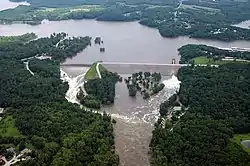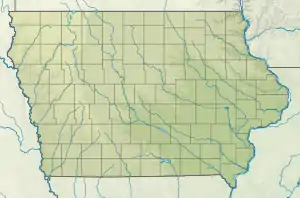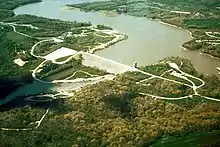| Coralville Lake | |
|---|---|
 Coralville Dam on June 15, 2008, with the main control gates fully opened, and water flowing over the concrete emergency spillway (left) at about 5 ft (1.5 m) deep | |
 Coralville Lake | |
| Location | Johnson County, Iowa, U.S. |
| Coordinates | 41°43′28″N 91°31′47″W / 41.72444°N 91.52972°W |
| Type | reservoir |
| Primary inflows | Iowa River |
| Primary outflows | Iowa River |
| Catchment area | Upper Mississippi River |
| Basin countries | United States |
| Water volume | 461,200 acre⋅ft (568,900,000 m3) |
Coralville Lake is an artificial lake in Johnson County, Iowa, United States, formed by the Coralville Dam, a dam built from 1949 to 1958 on the Iowa River upstream from the city of Coralville, Iowa.
History
| Coralville Dam | |
|---|---|
 | |
| Country | United States |
| Location | Johnson County, Iowa |
| Status | Operational |
| Construction began | 1949 |
| Opening date | 1958 |
| Construction cost | $15,744,000 |
| Owner(s) | U.S. Army Corps of Engineers |
| Dam and spillways | |
| Type of dam | Earth Filled Embankment |
| Impounds | Iowa River |
| Height | 100 ft (30 m) |
| Length | 1,400 ft (427 m) |
| Width (crest) | 22 ft (7 m) |
| Width (base) | 850 ft (259 m) |
| Reservoir | |
| Creates | Coralville Lake |
| Total capacity | 28,100 acre⋅ft (34,660,840 m3) (Normal pool); 421,000 acre⋅ft (519,295,854 m3) (Flood storage pool) |
| Catchment area | 3,084 sq mi (7,988 km2) |
| Surface area | 5,280 acres (2,140 ha) (Normal pool); 24,800 acres (10,000 ha) (Flood storage pool) |
| Maximum length | 23 mi (37 km) (Normal pool); 41.5 mi (67 km) (Flood storage pool) |
| Normal elevation | 679–717 ft (207–219 m) above msl |
| Website http://www.mvr.usace.army.mil/Missions/Recreation/Coralville-Lake/ | |
After widespread flooding in the United States during the early 1930s, Congress passed the Flood Control Act of 1938. The United States Army Corps of Engineers built the 100-foot-high earthen dam primarily as a flood control project for the Mississippi River. Construction started in 1949, was delayed by the Korean War, and was completed in 1958.[1]
The lake has a capacity of 461,200 acre⋅ft (568,900,000 m3) of water, equal to 137.18 billion gallons at its "100 year flood" level of 712-foot (217 m).[2]: 2
Floods
Water first flowed over the 712-foot (217 m) emergency spillway on July 5, 1993 (see Great Flood of 1993), reaching a then-record crest.[2]: 2 This flood uncovered what is now the Devonian Fossil Gorge.[1]
The 1993 record was surpassed by the June 2008 Midwest floods,[3] when water again flowed over the 712-foot (217 m) emergency spillway on June 12, 2008, and the reservoir crested at 717 feet (219 m) early in the morning on June 15, 2008.[4]
Lake Macbride is formed by another dam just up from the Coralville reservoir. This dam was overtopped by floodwaters in the flood of 2008, and the lake effectively became part of Coralville Lake.[5]
Recreation and public use
The lake and surrounding shoreline have been extensively developed for public recreational use, including hiking, biking, camping, fishing and boating.[6] There are 11 recreation areas, 4 swimming beaches, 3 Marinas, 18 boat ramps, 3 campgrounds (total of 620 campsites), 7 large picnic shelters, 2 Disc golf courses, and 7 trails (total of 29 miles).[7]
Photos
 Coralville Dam and Reservoir near Coralville, Iowa.
Coralville Dam and Reservoir near Coralville, Iowa. A tackle shop near Coralville Dam.
A tackle shop near Coralville Dam. Coralville Lake as seen from the airplane during winter
Coralville Lake as seen from the airplane during winter
See also
References
- 1 2 History US Army Corps of Engineers, n.d., retrieved March 22, 2015
- 1 2 "Coralville Lake" (PDF). U.S. Army Corps of Engineers, Rock Island District. October 2012. p. 2. Retrieved 22 March 2015.
- ↑ Flood of 2008 timeline | press-citizen.com | Iowa City Press Citizen June 15, 2008
- ↑ Coralville Reservoir crested Saturday night | press-citizen.com | Iowa City Press Citizen June 15, 2008
- ↑ "Coralville Lake flooding impacts nearby Lake MacBride". www.kwwl.com. Archived from the original on 2016-07-01. Retrieved 2016-05-31.
- ↑ "Coralville Lake • Lake Macbride 2012 Official Area Recreation Guide" (PDF). The Gazette, in cooperation with the Iowa Department of Natural Resources and the U.S. Army Corps of Engineers. 2012. p. 20. Retrieved 22 March 2015.
- ↑ http://www.mvr.usace.army.mil/Portals/48/docs/CC/FactSheets/ODC/Coralville%20Lake%20-%20Fact%20Sheet.pdf
External links
- U.S. Army Corps of Engineers, Coralville Lake (official site)
- Coralville Lake on Recreation.gov, recreation information and camping reservations
- U.S. Geological Survey Geographic Names Information System: Coralville Lake